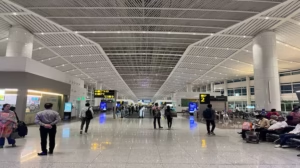In the wake of escalating tensions between India and Pakistan, Delhi’s Indira Gandhi International Airport has been placed on high alert following the Indian Armed Forces’ latest cross-border military operation, codenamed Operation Sindoor. This proactive step by Indian authorities reflects heightened security concerns amid a volatile regional atmosphere and growing geopolitical strain.
Early on Tuesday morning saw what sources define as a “sophisticated and coordinated military operation” launched by Indian troops against significant terror infrastructure along the Line of Control (LoC). The operation, code-named Operation Sindoor, is defined as being part of a considered response to recent threats and terror-related provocations from the other side. Although officially nothing is disclosed, the operation is said to be carried out with the aid of air and ground capabilities, a show of India’s anti-terror muscle.
Heightened Security at Delhi Airport
When the news of the operation came out, Delhi Airport administration increased the threat level as a security issue. Increased patrolling, deploying more staff from the Central Industrial Security Force (CISF), and increased surveillance in effect through the CCTV and face detection has been observed in all three terminals. Bomb scan units have been placed on alert and random screening for passengers at an increased scale has been reported.
A senior CISF officer also asserted, “It is a routine drill in any increase in military tensions. Delhi Airport is a key infrastructural hub and needs to be protected against any possible threat—be it internal or external.”
Tourists reported that they noticed increased checks at entry points, increased security point lines, and coordination with visible control among airport staff and law enforcement officials. Although the government had assured tourists that flights are running full scale, several international airlines have released advisories asking customers to report on time and collect latest about developments from credible sources.
Operation Sindoor: A Planned Strike
Operation Sindoor, so named after sacred vermillion in Indian tradition used to symbolize security and strength, was said to be on the cards as a reaction to actionable intelligence that there existed a plot for terrorism in the pipeline. Defense analysts said the targets were suspected insurgent camps allegedly harboring insurgents who intended to invade Indian borders.

The choice to pursue a small, high-precision operation was a departure from India’s policy of preventive self-defense. The operation would be low on collateral damage but high on messaging to state and non-state actors that are engaged in cross-border terrorism, military officers said.
The government has not yet publicly confirmed the extent of the operation but asserted India’s right of sovereignty for self-defense. MEA briefings revealed that the friendly foreign nations had been apprised of the action and the rationale of the action taken.
Panic in Pakistan: A Reaction to the Strike
The effects of Operation Sindoor have apparently sent shock waves in Pakistan, especially in border regions along the LoC. Certain Pakistani media and social media have been circulating unverified reports of mass evacuations of villages along the border, cutting off communications, and rerouting army convoys to strategic locations.
Opposition leaders in Pakistan condemned their government as unprepared and called for more transparency at the event. India’s intelligence forces are keeping a very close eye on developments on the other side of the border for any sign of a counter-attack.
Panic in Pakistan does not mean just the physical regions close to the border. Politically, Pakistan is caught between wanting to retaliate without taking the war into an open one. It is the weighing of national ego against world disapproval.
The Role of Civil Aviation in Times of Conflict
Airports such as Delhi are not merely points of transit but also symbols of national stability and control. During periods of geopolitical tension, they are points of physical and psychological defense systems. The decision to put Delhi Airport on high alert is not a precautionary one—it is a strong indication of India’s resolve to protect its civilian population and infrastructure.
Aviation officials have indicated that airspace above northern India has been left open but under strict surveillance. All airlines have been instructed by the Directorate General of Civil Aviation (DGCA) to stay in contact with Air Traffic Control (ATC) and ready to divert flight routes if the situation goes against their favor.
Public Perception and Media Response
Public response to Operation Sindoor has been largely positive, with the people hailing the army for having acted so quickly. Social media has had the hashtags #OperationSindoor and #IndiaStrikesBack trending on all social media. Peaceful appeals and demands for restraint have also been expressed, mainly by civil society and the diplomatic corps.
TV debates and internet forums have been converted into sites for impassioned argument, with some analysts cautioning against extended military intervention and calling on both nations to return to the negotiating table.
Conclusion
With Delhi Airport placed on high alert and regional tensions burning following Operation Sindoor, the next few days would be critical in deciding the destiny of Indo-Pak relations. While the endeavor of the war might have earned short-term triumph in combat in the field, its total legacy—here and abroad—still has to be seen. At the same time, officials stay vigilant, visitors are asked to observe further security checks, and everyone waits anxiously as two countries with atomic capability take another hot spot in tow.








Leave a Reply